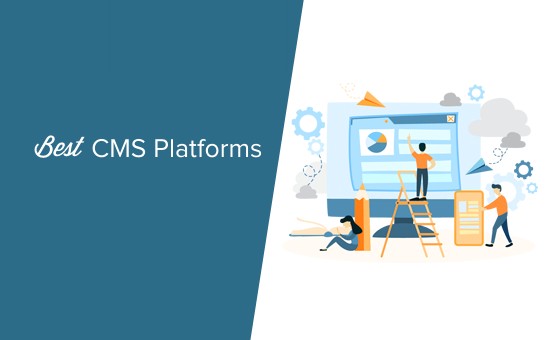Wondering what are the top CMS for business? This blog will help you find out.
Small businesses need effective and intuitive content management solutions. Looking at features, usability, and more, these are our top choices. When you’re creating a site, your business will need the best content management systems (CMS) for its unique needs. During your research, you’ll need to try out a few CMS tools and take notes on which ones have the features and overall capabilities to make your dream website.
Here are the top picks for the best content management software for small businesses:
1. WordPress
2. Squarespace
3. HubSpot CMS
4. Kentico
5. Wix
Top CMS for your business
1. WordPress
If you are looking for a free content management system, WordPress is going to be at the top of your list. Known for its open-source system, WordPress offers a lot of functionality to a lot of sites for very little financial investment.
WordPress adapts to the user, too, so if you want to get technical, you can. If you prefer a more streamlined approach, you can use any number of prebuilt templates to design and build out pages, edit content, manage media libraries, assign out multiple logins, and more. In keeping with its ability to scale to your needs, WordPress offers over 50,000 additional app options. Many are free, some cost money, but they allow you to create your perfectly adaptable CMS experience.
The WordPress app library, featuring troubleshooting apps, editing features, and more.
A 50,000+ app library expands your content manager’s capabilities. Built to be SEO-ready, WordPress sets you up for success with search engine optimization from launch day. Because of its intuitive nature, it’s excellent for beginners. Its open-source ability also makes it great for experienced developers.
2. Squarespace
If you prioritize a professional look and clean aesthetics, Squarespace is the content management tool for you. With a vast library of professional themes and templates that can be searched by industry, Squarespace builds a sleek site without you having to worry about coding or managing a complicated backend.
Squarespace templates use drag-and-drop technology to build and edit, making the whole design phase a breeze. It’s rather intuitive, and you can get more invested in the aesthetics without worrying about the infrastructure. Squarespace integrates with Getty Images to make sourcing and implementing images easier.
The basic Squarespace plan starts at $12 per month, following a two-week free trial, when billed annually. However, if you want to sell products, you’ll have to upgrade to the Commerce plan, which starts at $40 per month with an annual subscription.
3. HubSpot CMS
HubSpot CMS is a natural at content management. Right off the bat, its intuitive content setup costs a lot. It is the most expensive CMS on this list, starting at $300 per month, plus an $800 onboarding fee. However, that pricing includes quite a lot of features, giving you a lot of bang for your buck. Built for creatives and non-developers, HubSpot CMS has an excellent support system with an extensive library of resources and dedicated account managers.
It also has several cool features you won’t find in other places, including its ability to do A/B tests for webpages. Like split testing for emails, you can test and track the success of various versions of the same pages to determine a winning page. Analytics and SEO are second nature to HubSpot CMS. It automatically analyzes search engine algorithms and optimizes your pages via tips as you are building or automatically calling out fields and backlinks that will help you rank.
4. Kentico
Kentico nails adaptability without sacrificing usability. Without needing to learn complicated coding on your end, you can set up multiple user management, Google integrations, customer management tools, and more. And, since it’s highly customizable, you can create unique and professional websites. Kentico’s always-on support teams assure you’re never lost and that all sites’ security remains top of mind.
As an extra unique feature, Kentico can automatically translate pages, making your site multilingual without added effort. Embedded widgets make ongoing maintenance easy and able to be done in-house. At the same time, content recycling means more efficient use of pages and media without continually reinventing the wheel. Kentico starts with a free trial, but then the price does go up to $7999 per year. However, it comes with enough features, support, and security to make it worthwhile if you have the budget.
5. Wix
Wix is all about being customizable and easy to use, whether you opt for a site built by Wix or use its drag-and-drop builder. You can answer a few questions about your business (and your site’s wishlist), then upload a logo, and Wix will create a website for your business, giving you color palette options based on your logo. Or, you can skip the templates and create a site freehand, though still by dragging and easy editing.
Wix also automatically mobile optimizes all sites, so you can rank well in search engines, and your audience has an easy time browsing. Wix also automatically installs and upgrades security updates, so you’re always protected. The pricing is affordable, with a free plan option that never expires. Then, for just $13 per month, you can connect a domain name, remove ads, upgrade features, etc., making it a very budget-friendly option.
So, here we wind up the list of top CMS for business.
Also Read: Top 7 AI Content Writing Tools for Writers and Marketers in 2022














